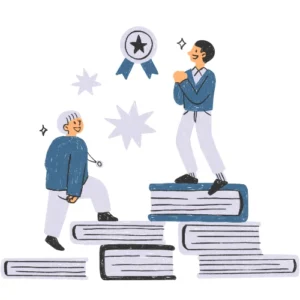Focus and Flourish: ADHD Study Tips
This article has been adapted with an ADHD-friendly design.

What is ADHD?

Tip 1: Master Your Time and Tasks
One of the biggest challenges of studying with ADHD, is managing time and staying organized. The good news? These are skills you can build.
Get Structured Skills Training: ADHD research has found that just three one-hour sessions focused on organization, time management, and planning can significantly reduce inattentiveness and academic struggles (LaCount et al., 2018).
Use a Daily Planner: A simple planner is your best friend. Write down your assignments, deadlines, and daily goals to keep track of everything without feeling overwhelmed.

Break Big Tasks into Milestones: Large projects can seem impossible at first. Break them into smaller steps and focus on completing one chunk at a time, a strategy encouraged by the Canadian ADHD Resource Alliance (CADDRA).
Tip 2: Use Mental Tools That Help You Focus
How you think about your work is just as important as how you do it.
Try Cognitive-Behavioral Therapy (CBT) Techniques: Studies show that CBT can help reduce inattentive symptoms and boost academic performance by teaching skills like problem-solving and self-control (Knouse ,2015).
Practice Self-Testing: Regularly quiz yourself on your material. This simple strategy, supported by educational psychology, strengthens long-term memory.
Explore Mindfulness: It was found that six weeks of Mindfulness-Based Cognitive Therapy (MBCT) improved ADHD symptoms and even GPA. While it requires commitment, daily mindfulness can be powerful for your focus (Gu et al. 2018).
Tip 3: Engineer Your Ideal Study Environment
 Your environment has a huge impact on your ability to focus.
Your environment has a huge impact on your ability to focus.
Find Your Quiet Zone: Choose a calm, distraction-free spot to study. In class, try sitting near the front to limit interruptions.
Block Out Distractions: Noise-canceling headphones, earplugs, or white noise machines can create a “focus bubble” to keep distractions at bay.
Build Consistent Routines: Try to study at the same time and place each day. Building predictable habits helps your brain know when it’s time to focus.
Tip 4: Work in Sprints, Not Marathons
Long, continuous study sessions can lead to burnout. Instead, break your work and time into manageable pieces.
Work in Short, Focused Bursts: Use techniques like the Pomodoro (25 minutes work, 5 minutes break) to keep energy up and concentration sharp.
Take Strategic Breaks: Use breaks to move around and release excess energy. These aren’t lost time—they help you come back refreshed.
Divide and Conquer Tests: For exams, ask your school’s accessibility services about receiving test pages one at a time to simplify processing and reduce overwhelm.
Tip 5: Become Your Own Accountability Partner
Taking control of your learning through self-monitoring is empowering.
Track Your Habits: Studies show that self-monitoring leads to big improvements in homework completion and focus.
Know What Helps You: Pay attention to what supports your focus—whether it’s a stress ball, a drink, or a particular study spot—and use these tools intentionally.
Use Your Planner for Reflection: Beyond scheduling, use your planner to note what worked and celebrate your progress, helping you fine-tune your study habits.
Did You Know?
Study Smarter, Not Harder
Living with ADHD in post-secondary education comes with unique challenges, but it’s absolutely manageable. By using these research-backed ADHD study tips and seeking support from Oulton college campus resources, at Student Services, you can turn your differences into strengths. 
Remember: ADHD doesn’t hold you back; it just means you’ll study a little differently—and that’s okay. With the right tools, you can not only succeed—you can thrive.
Book an Admissions Meeting Today!
Remember that by investing in your education, you are investing in your future, gaining the skills and connections you need to thrive in your career and life. We hope these ADHD study tips will help you succeed throughout your journey with Oulton College and beyond.
*Please note that information may be subject to modifications. We encourage current and prospective students to visit the websites in order to obtain the most recent information.

